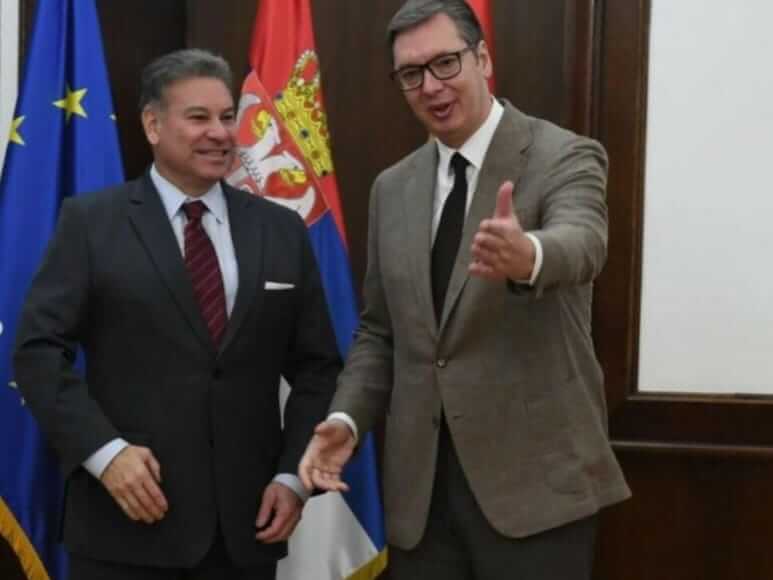All appeared perfect between Kosovo and the US in Skanderbeg Square in Pristina two weeks ago. There was a ceremony to mark a large-scale military exercise Defender Europe, where as many as 7,000 US soldiers were supposed to participate. The speeches were appropriate and friendly. Vjosa Osmani mentioned Skanderbeg as a “defender of Europe” in his time.
But the magic wore off after just a few days. The US lost patience with Kurti and his entourage, and they got slapped in the face. Something similar has not happened in the Balkans for a long time. They were shocked. They did not understand what happened, deeply convinced that it was impossible for the US, as the father and mother of their independent state project, to treat them in such a manner.
The US imposed sanctions on Kosovo overnight without announcements or explanations. The reason was that Kurti refused to implement what he agreed upon regarding the truncated elections in the north of Kosovo. Instead of repairing the damage, he sent armed police to force his mayors into municipal buildings. He has caused a conflict. Everyone important in Washington, Brussels, and NATO said so without exception.
A liberal, young European, untainted by the war past and corruption, as Kurti was celebrated in the West when he came to power, has turned into a chauvinist and a Maoist. Or, after all, he always has been, but it just wasn’t practical to admit it.
For the harsh message sent to him by the head of US diplomacy, Antony Blinken, Kurti said it was “dishonest, wrong, insulting and naive.” Even great US enemies such as China or Iran would have chosen their words more carefully.
He left the envoys from Washington and Brussels, Gabriel Escobar and Miroslav Lajčák, in the waiting room until the final of the Kosovo Football Cup was over, and he handed over the trophy to the players of FC Pristina. “The people elect the prime minister, and the people do not submit to the delegates,” said one of Kurti’s advisers.
Kurti is confident he is the leader of an independent and sovereign state and that he leads the country with powerful patriotism. But Albin Kurti went too far in his suicidal rebellion against the US and Europe. Kosovo is facing severe sanctions: the takeover of the north by KFOR, blockade of visa liberalisation for the EU and the membership in the Council of Europe, blocking of European funds, and probably also personal sanctions against Kurti and some of his ministers. There is also the announced withdrawal of the US from persuading five EU members to recognise Kosovo and probably a green light to Belgrade to continue with its campaign of new withdrawals of recognition of Kosovo’s independence.
The US anger at Pristina does not mean that Washington has turned its back on Kosovo and its independence, as local believers in the victory of some divine justice like to interpret it.
When it comes to the US policy regarding Kosovo, it has not changed. There is only a consistent application of the US policy towards dialogue on Kosovo as the only path to a solution. Kurti sabotaged that dialogue more crudely than ever before. And he has sabotaged it many times. Now his arrogance has crossed all limits.
This hope for some change in the US policy is naive but harmless. The Russian policy is, however, dirty and dangerous for Serbia. The Russian ambassador to Serbia, Alexander Botsan-Kharchenko, said that the West was “inciting” Pristina to violence, that threats of sanctions are hypocritical and false, that strengthening KFOR is an “anti-Serbian measure,” and that we are facing new conflicts and bloodshed. He has the support of the headquarters. The Russian Foreign Ministry Spokeswoman Maria Zakharova said the West has been trying to incite extremists from Pristina to attack Belgrade.
They are both unhappy that the US and Europe have no mercy towards the authorities in Pristina. By twisting Pristina’s hand, they return it from a violent adventure to the negotiating table with the obligation to fulfil everything it has committed to.
The ambassador and the spokeswoman have a problem with their bosses because their policy on Kosovo had not been implemented. There will be no flare-up of conflicts in and around Kosovo despite Kurti’s incendiary offensives. There will be no war between Serbia and NATO, which Moscow has been wishing for so long and has been persistently working on.
What the US has been doing to Kurti and Pristina, it has been doing to Serbia for years. Not because the US hates Serbia or wants to destroy it, but because Serbia lied, tried to deceive, and did not fulfil what it promised. Russia cannot bear that Serbia changed and is no longer what it used to be when it produced conflicts instead of resolving them.
Serbia is facing a historic resolution of the Kosovo conflict. Serbia has reached this by finally understanding it could not solve its most significant problems in confrontation with the West and the US, but only through cooperation with them, even if it lasted for ten years, as it did.
The alternative from Moscow is faster and seemingly simpler. A simple solution to a complicated problem: raise an army and take what is yours. We will support you if needed. The only problem is that it leads to the destruction of Serbia, but that is none of Russia’s business. They would “support” us the only way they know how and “liberate” us like Ukraine.
